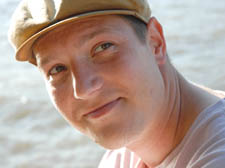|
|
 |
| |
| |

Finn Peters, a modern day jazz legend |
Camden classical music | Finn Peters | Pizza Express Jazz club preview
PREVIEW: FINN PETERS
Pizza Express Jazz Club
GIVEN his background and reputation, it’s hardy a surprise that Finn Peters’ new album branches into new territory.
One of the leading flute and sax players in the UK today, Peters comes from a family of musicians that, apparently, can be traced back to the 1600s.
One of the great innovators of moderns jazz, Peters has racked up 80 album credits – as well as a number of his own recordings – and he last year added the BBC Jazz Award for Best Band (Finntet) to his 1999 London Young Jazz Musician Award.
The most impressive thing about Peters – and the thing that has earnthim a large number of devotees – is his ability to turn his hand to almost any style of music.
Acoustic jazz, hip-hop, electronica, Afro-Cuban, classical – they’re all in his armory, and make his blistering live sets all the more interesting than a straight jazz virtuoso performance.
Peters’ new album, Butterflies, strikes a more reflective tone than some of his earlier work, and suggests an artist who isn’t afraid to write a little depth into his work.
For example, the album’s title track is based on the music that accompanies the traditional Balinese Butterfly and Bird dance, while the cyclical Octet takes its inspiration from nature’s recurring mathematical structures.
Composed in the quiet Devon countryside, the album draws on influences ranging from the works of Olivier Messiaen to the nature-inspired sounds of Brazilian composer Hermeto Pascoal.
On The Nightingale, real birdsong (as recorded by Peters in a wood in Devon) sits beneath gentle flute melodies which ebb and flow alongside electronic sounds as the tune progresses.
However, as meditative or searching as Peters’s music gets, he never loses sight of the essential elements of strong melodies, solid rhythms and intelligent harmonic interplay.
On Butterflies, Peters brings together the huge variety of music he has experimented with in the past, combining it with his own original ideas, concepts and philosophies. He says the title is inspired by the great Chinese thinker Chuang Tzu, whose dream of a butterfly caused him to question his own placement and existence within reality: so it’s not exactly throwaway music for the rush hour commute, then.
With so extensive and varied a background to draw upon, this fascinating and at times beautiful album stands out as the work of a musician able to create a sound that is both familiar and original, but far from settled or complacent.
Well worth a listen.
|
 |
|
 |
|
|
 |
|








